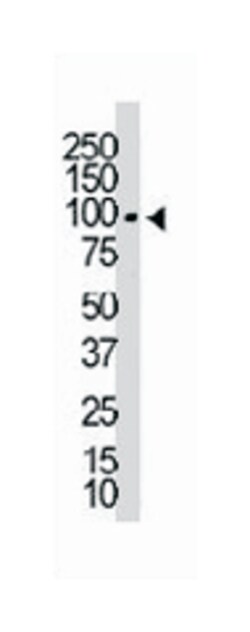Learn More
DDR2, Rabbit, Polyclonal Antibody, Abnova™
Rabbit polyclonal antibody raised against synthetic peptide of DDR2.
Supplier: Abnova Corporation PAB3404
Description
Receptor tyrosine kinases (RTKs) play a key role in the communication of cells with their microenvironment. These molecules are involved in the regulation of cell growth, differentiation, and metabolism. In several cases the biochemical mechanism by which RTKs transduce signals across the membrane has been shown to be ligand induced receptor oligomerization and subsequent intracellular phosphorylation. This autophosphorylation leads to phosphorylation of cytosolic targets as well as association with other molecules, which are involved in pleiotropic effects of signal transduction. RTKs have a tripartite structure with extracellular, transmembrane, and cytoplasmic regions. This gene encodes a member of a novel subclass of RTKs and contains a distinct extracellular region encompassing a factor VIII-like domain. Alternative splicing in the 5' UTR results in multiple transcript variants encoding the same protein. [provided by RefSeq]
Specifications
| DDR2 | |
| Polyclonal | |
| Rabbit polyclonal antibody raised against synthetic peptide of DDR2. | |
| In PBS (0.09% sodium azide) | |
| Q16832 | |
| DDR2 | |
| A synthetic peptide (conjugated with KLH) corresponding to amino acids 304-320 of human DDR2. | |
| 400 μL | |
| Primary | |
| Human | |
| Liquid |
| ELISA, Western Blot | |
| Unconjugated | |
| Western Blot (1:1000) The optimal working dilution should be determined by the end user. | |
| DDR2 | |
| MIG20a/NTRKR3/TKT/TYRO10 | |
| Rabbit | |
| Protein G purification | |
| RUO | |
| 4921 | |
| Store at 4°C. For long term storage store at -20°C. Aliquot to avoid repeated freezing and thawing. |
Your input is important to us. Please complete this form to provide feedback related to the content on this product.
For Research Use Only
